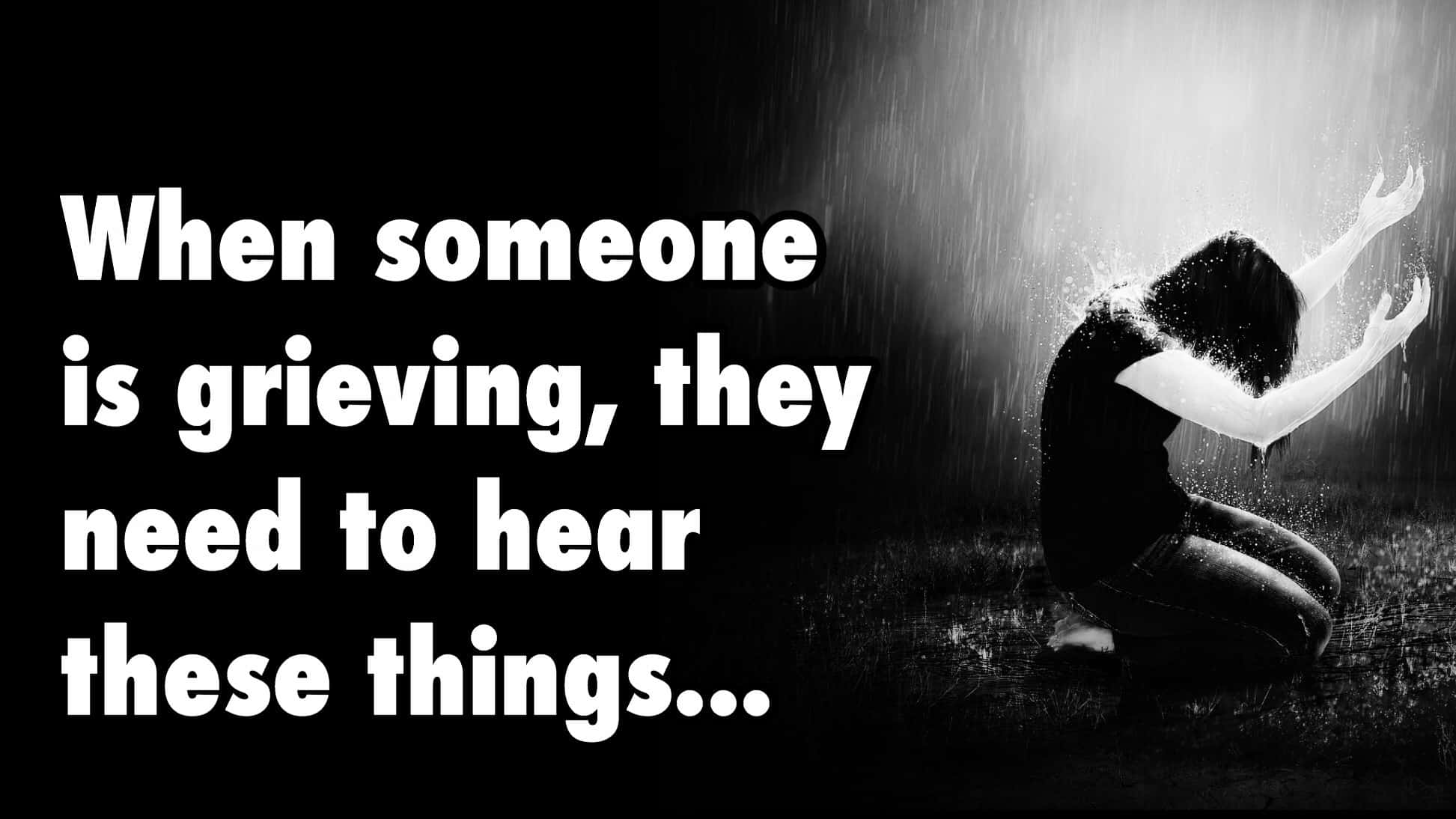Grief is an uncomfortable emotion and not knowing what to say is very common, but there are at least ten things that a grieving person wishes you would say. Grief can look different depending on the circumstances. The grieving person may be dealing with the significant illness of a loved one who is still living or the sudden loss of a child. How can we best help our loved ones at a time like this?
10 Things to Say To A Grieving Person
Depending on how much time has passed since the sad event that changed their life, it can be challenging to know what a grieving person wishes you would say. Rather than say something that feels awkward to us, we sometimes don’t say anything. That can be the worst thing you could do for a grieving person.
1. I cannot possibly know the pain that you’re experiencing.
And you can’t because each person grieves individually and in different ways. Their experience of the loss is different from your own. Don’t try to compare.
2. Crying is perfectly normal, and this is a safe place to do it.
Make your friend feel comfortable with tears. Often, people feel embarrassed about crying in front of other people, so they hide their tears or ask you to leave so they can cry privately. Let them know that you’re comfortable with tears and there is no judgment.
3. Crying is perfectly healthy, and this is a safe place to do it.
In his book, The Nature of Grief: The Evolution and Psychology of Reactions to Loss, author John Archer says crying is cathartic, and it may serve several healthy purposes for us as we heal. Crying is an emotional release of overwhelming sadness in the body. Crying is an emotional outburst, and it can be a social tool, as in a cry for help from the bereaved. We are rarely processing thoughts as we weep but are just allowing the emotion to flow out of us in waves like a river flowing to the ocean.
4. You don’t have to talk about your emotions.
The grieving person isn’t always willing or able to talk about the loss. A grieving person wishes you would let them know that you have no expectations for their willingness to talk about it with you. If they do, great, you’ll be there for them, and if not, you’re not going anywhere.
5. I would love to see you again tomorrow. Is after 10:00 going to be ok?
In the worst of it, someone grieving a deep depression will not be able to help themselves see any positives. Forcing the issue of breaking their social isolation is the best thing, to at least try, for a grieving person.
6. Remind them of a happy shared experience.
Nothing can remove the grief that a person is experiencing, but you can help minimize it by incorporating joyful memories. ‘Did I tell you about when I spilled my latte all over myself just as Willie Nelson was opening the door for me at Starbucks?’
7. What did you like to do in art class when you were in school?
This may seem like a strange question, but there’s a reason for it. Researchers have found that artistic expression is an effective way of dealing with grief. Researchers looked at cancer patients who were going through coping after receiving a cancer diagnosis. Although a diagnosis with cancer is not the same as having a loved one pass away, both a grieving person and a person diagnosed with cancer start the grieving process in basically the same ways.
The researchers say, ‘The objectives of art therapy are to use the creative process to allow awareness and expression of an individual’s deepest emotions. These emotions may be about the illness, hospitalization, relationships, or other concerns for people with cancer. These emotions’ meaning and power are often not easily articulated using verbal communication. The art itself provides a vehicle for expression, aided by the actual physical movement of artistic materials.’ Art therapy reduced symptoms of depression, anxiety, and tiredness, as well as improved appetite and feelings of well-being.
8. Did I tell you about _____?
Sometimes grief makes us feel socially awkward around a person like we aren’t sure what to say to them as if something will offend them. The best thing you can do is act normal and talk about the same things you would usually talk about anyway.
9. Because this cannot be easy for you, I would like to help in this (specific) way.
Make a suggestion. Offer to prepare meals for their family for the next three nights. Offer to include them with your family meal out on the town. Bring over your favorite movies to watch together.
10. I would love to invite you to come to ____ next week.
Giving a grieving person time and space to get the majority of the initial loss and sadness out of their system, but committing to get them away from any self-imposed confinement during the grieving process and into a supportive social atmosphere. Excluding a grieving person from social events is cruel to them, no matter your intentions toward your guests about avoiding awkwardness.
11. I’m sorry that you’re suffering right now.
Many people want to convince a grieving person that the situation is for the best. However, that’s not the right thing to say to a suffering person. It’s a personal and confusing time for them, and they’re hurting no matter what.
If the grieving person lost a loved one to death, you might want to say that their person is in a better place. However, you never know what they believe in, and even if they do believe in a better place, it doesn’t mean their pain is any less.
Play it safe and tell them that you’re sorry they’re suffering right now. No matter the situation, the person is in pain, and you don’t want to diminish their feelings.
12. I know how much you loved them.
The loss of a loved one is painful, and brushing the feelings aside is dismissive. Instead, point out that you know they loved the person they lost. When you say things like this, it validates their feelings and helps them see that you recognize their pain.
This phrase also shows that you are comfortable with their feelings on the topic. Some people try to hide their feelings for the sake of others, but it’s best when they know they can be honest with you.
13. I don’t have the right words to say, but know that I care.
Be authentic when you talk to someone going through grief. Please don’t pretend to know what they’re going through or that you have the right words. Instead, be honest that you don’t know what to say, but let them know that you care about them so much.
If you don’t know what to say but try to say something anyway, it doesn’t always go well. You might unintentionally minimize the other person’s loss or provide unhelpful solutions. It’s best to admit you don’t know what to say and spend your time listening.
As long as they know you’re there for them, they won’t care if you know what to say. The person doesn’t expect you to have the answers or make all of their pain disappear. However, they will notice if you say things you don’t mean.
14. I am here for you to lean on, and I have a heart open to listening.
It’s hard to know what someone needs, but you can be sure that they need someone to listen with an open heart. Research shows that people can recover from grief with social support.
All that they know is to know someone is there to listen or sit with them. Express your concerns without minimizing or invalidating their feelings, but let them know that you are there for them.
15. Let me know what I can do for you.
Offering your support to a grieving person is one of the best things you can say. All that you have to do is ask what you can do to help and support them. Sometimes they only need a presence as they work through their grief.
Other times they’ll have specific tasks they need your help with. It’s always nice to offer support in a specific way, but when that’s not possible, tell them you’re available when a need arises.
16. It takes time to ease your pain, and I’ll be here.
When figuring out what to say, please don’t imply that time will eliminate their pain. They’ll likely always have painful feelings surrounding their grief, but it will ease. This phrase lets them know that you don’t expect them to feel okay anytime soon and that it’s okay.
Let the person know that you’ll be there through it all, no matter how long it takes. Research shows that grief doesn’t follow the same patterns in every person or take the same amount of time. Please don’t put a time limit on their suffering, or it’ll make them feel like you don’t support them.
17. I am here for you whenever you’re ready to talk.
When you put it this way, it lets the person know that it doesn’t matter how long it takes for them to be ready. It could be years before they’re prepared to talk about what happened, but they’ll find comfort knowing you’re there. Please don’t talk about your experiences with grief while waiting for them to talk, either.
Once they’re ready to talk, maintain eye contact and listen with judgment. Don’t think about what to say in response, but paraphrase what they said and ask questions for clarity. It’ll show that you are actively listening, encouraging them to continue talking.
If they aren’t ready to talk yet, stay there to keep them company. Your support will mean so much to them and help them get ready to talk about the situation.
18. I’m coming over to keep you company.
Don’t wait for an invitation when you know someone is suffering. The person might not feel comfortable asking you to come over or realize that it’ll help them. Instead, tell them that you’re coming without giving an option.
They’ll be thankful you did because it’ll make them feel much better. Having someone to sit with is one of the best ways to cope with grief.
You don’t have to talk while you’re there unless they want to. The person might not be in the mood to speak yet, so don’t force them, and they’ll appreciate the company.
19. How do you feel right now?
When experiencing grief, a person’s feelings can change by the minute. Asking how they feel right now lets them know that you recognize that emotions can change quickly and frequently. They’ll be relieved that you don’t assume to know how they feel at any moment.
Grief is an individual experience, and the process differs for everyone. Let the person know that they can feel however they want to when you’re around.
Don’t judge, and allow them to be angry, heartbroken, or any other emotion. If the person shares their feelings with you, don’t try to soothe them or change their mind. Instead, allow them to let it all out.
20. It’s okay to feel the way you’re feeling.
This phrase lets the person know that you’re there to support them, no matter how they feel. It shows that you’re a safe person who won’t judge their grieving process.
Validate their feelings by normalizing the emotions and helping the person feel less alone. Experts say that people shouldn’t feel wrong about their feelings during the grieving process. Ensure that the person you’re talking to knows it’s okay no matter what emotion they experience.
You want the person to know that they don’t have to hide how they feel when you’re around. They can be what they need to be without someone judging them or giving unsolicited advice.
21. I know that this is a fight for you.
No matter what a person is going through, they’re struggling each day. You can’t make their pain disappear, but you can tell them you know it’s a fight. Your acknowledgment will mean more to them than false hope, and it’ll help normalize their feelings.
22. I’d love to hear about your loved one.
When someone loses a loved one, don’t think they don’t want to talk about their loss. The person might want to talk about the person they lost, so let them know you want to hear it.
Sometimes they’ll tell the same stories repeatedly, and that’s okay. Be patient, and allow them to process and accept the situation however they need to. Providing them a listening ear for their stories and memories can help them heal.
23. I know it’s hard for you to keep being strong.
When you don’t know what to say, please acknowledge that you know it’s hard to be strong during a hard time. Don’t tell the person that they are strong, or it implies that they always have to put up a front.
Instead, let them know that it’s okay if it’s a struggle for them. Grief is intense, and this statement takes away some of the pressure.
24. My favorite memory of them is…
When someone is grieving the loss of a loved one, you might be hesitant to mention the deceased. However, most people will find comfort in hearing stories about their loved ones.
Even if you only have one or two memories, tell the story anyway. They will enjoy having a comforting space to talk about their loved one and can find peace knowing they are remembered. It also gives them a perspective they wouldn’t have had otherwise.
25. Don’t Say Anything
Sometimes it’s best to say nothing at all. When this is the case, consider physical touch to comfort the grieving person. A hug or touch on the shoulder can mean so much to someone suffering.
If the person wants to talk, be the listener that they need. However, don’t push them to talk about it, but sit in comfortable silence when that occurs, instead. They still want and need the company, so don’t judge, give advice, or ramble during this time.
Final Thoughts on Helping a Grieving Person
When you reach out to a grieving person, you might not know what to say. Acknowledge their grief and avoid invalidating their feelings. Don’t offer unsolicited advice, either, as everyone’s situation is different.
Be supportive of the grieving person and follow their lead. Use these phrases to help you express your concern while acknowledging their grief. Your presence will help them, especially if they know you aren’t judging their process.

















 Community
Community

